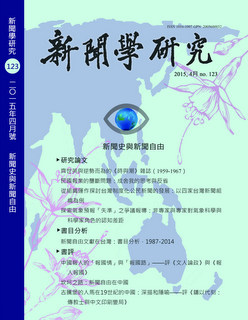前期出版
前期出版
頁數:91﹣143
從組織運作探討台灣制度化公民新聞的發展:以四家台灣新聞組織為例
From the Organizational Operations to Explore the Development of Institutional Citizen Journalism in Taiwan: Using Four News Organizations as Examples
研究論文
作者(中)
林宇玲
作者(英)
Yu-Ling Lin
關鍵詞(中)
新聞學研究,政大
關鍵詞(英)
citizen journalism, convergence culture, institutional citizen journalism, media gate-keeping, professional practices
中文摘要
本文採用多元方法檢視四家不同經營型態的新聞組織,如何發展公民新聞平台或服務。結果發現,新聞組織的結構因素(如:媒體定位、所有權、經營型態、人員編制等),會影響公民新聞平台的設計(包含生產方式和管理機制)與運作。
表面上,四家平台不論規模大小,都符合公民新聞的理念──公民記者享有媒體近用權和言論自由,不需經過編輯審查便能發文。但從實際運作來看,公民新聞和專業新聞仍有所區隔;公民新聞一旦要進入專業領域,仍須通過編輯的控制過程。此外,平台也試圖利用各種手段(如:教育培訓、物質獎勵等),以隱微的方式影響公民記者的表現。是以,公民記者在新聞組織內發展公民新聞學,在某種程度上仍須受制於組織的「品牌」和制度化的程序。
表面上,四家平台不論規模大小,都符合公民新聞的理念──公民記者享有媒體近用權和言論自由,不需經過編輯審查便能發文。但從實際運作來看,公民新聞和專業新聞仍有所區隔;公民新聞一旦要進入專業領域,仍須通過編輯的控制過程。此外,平台也試圖利用各種手段(如:教育培訓、物質獎勵等),以隱微的方式影響公民記者的表現。是以,公民記者在新聞組織內發展公民新聞學,在某種程度上仍須受制於組織的「品牌」和制度化的程序。
英文摘要
This study adopts multiple methods to examine four different-operated citizen websites of news organizations in Taiwan, in order to understand the development of institutional citizen journalism. It finds that structural factors of news organizations (such as orientation of the company, ownership, production model, staffing, etc.) will affect the design and operation of citizen websites.
On the surface, no matter what size of company, four news organizations accord with the ideal of citizen journalism-- citizens have the right of access to media and the freedom of expression, they allow citizen journalists to publish their news without editorial review. Based on the actual operation, news organizations separate the citizen journalism from professional journalism; once entering the professional field, citizen-produced news is still edited by professional editors. Moreover, news organizations also try to use a variety of means (e.g., education training, incentives, etc.) as implicit ways to affect the performance of citizen reporters. Therefore, the development of citizen journalism within a news organization, citizen reporters are to some extent still subject to the “brand” of and institutional procedures of the organization.
On the surface, no matter what size of company, four news organizations accord with the ideal of citizen journalism-- citizens have the right of access to media and the freedom of expression, they allow citizen journalists to publish their news without editorial review. Based on the actual operation, news organizations separate the citizen journalism from professional journalism; once entering the professional field, citizen-produced news is still edited by professional editors. Moreover, news organizations also try to use a variety of means (e.g., education training, incentives, etc.) as implicit ways to affect the performance of citizen reporters. Therefore, the development of citizen journalism within a news organization, citizen reporters are to some extent still subject to the “brand” of and institutional procedures of the organization.
987次下載



